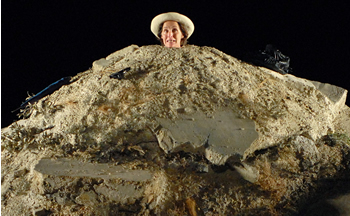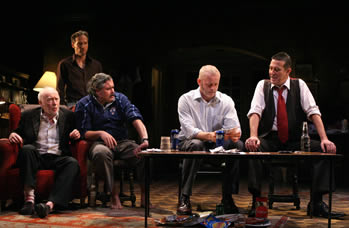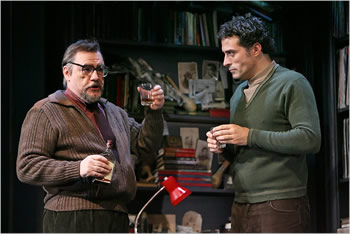HotReview.org Editor's
Picks
Shows Worth Seeing:

Happy Days
By Samuel Beckett
BAM Harvey Theatre
651 Fulton St., Brooklyn, NY
Box office: (718) 636-4100
Despite all the hoopla surrounding Beckett’s
centennial in 2006, there hasn't been a really major (read: mind-changing,
inspiring and effective) Beckett production in New York in many
years. One has just arrived, however: Deborah Warner’s production
of Happy Days, with an extraordinary performance by Fiona
Shaw as Winnie. Anyone who has never seen this play before, or
who has appreciated it dutifully without ever really enjoying
it, should rush out to see this version, which is absolutely true
to the grim situation and subject matter but nevertheless fun,
uplifting and revelatory about a much-produced modern classic.
The action, of course, involves a woman filling time while buried
up to her waist in one act and up to her neck in the next. Here
the setting is not the plain earthen mound the script calls for
but rather an expanse of broken concrete chunks that plays gorgeously
and resonantly against the arrested decay of the BAM Harvey Theater:
self-conscious theatricality standing as a counter-pressure to
inevitable processes of wasting away. Shaw plays a younger-seeming,
more extroverted and hence more insecure Winnie than I’ve
ever seen before. More remarkable, she succeeds in engaging the
audience more than any other actress has, with innumerable coquettish
shrugs, grins and comic gestures that are never cheap or dishonest
but nevertheless frequently produce squeals of pleasure from the
house. That’s right, squeals of pleasure—in Beckett!
The show is simply a liberating experience. Don’t take my
word for it. Just go.
----------------------------------

The Homecoming
By Harold Pinter
Cort Theatre
138 W. 48th St.
Box office: (212) 239-6200
Pinter considers The Homecoming his
greatest play. He’s proud of the shape of it—a slow,
scary rise culminating in a precipitous fall, like the first drop
of a roller-coaster—and he speaks fondly of its savagery
as the flip side of family love. The play is certainly the closest
he ever came to endowing one of his deliberately enigmatic situations
with the quality of myth: a man returns with his wife to his childhood
home, is drawn instantly back into a weird battle of wills he
left years ago, and discovers that his wife (the only female in
the house) is now a powerful player in the newly configured battle,
despite being spoken of as a victim. The Homecoming is
a masterpiece that rarely comes off as one in performance because
it contains so many ruinous traps for actors and directors: the
temptation to invest in the seedy north London reality, for instance,
or the hints of Jewish background, or the tones of screeching
hostility. The play works only under conditions of intense control
that many actors find unnatural—especially with the role
of Ruth, the wife, an alien among aliens. Daniel Sullivan’s
production at the Cort Theatre is an extraordinary instance of
such control. Each of the actors is splendidly precise, narrowly
defining a focus of both desire and malice for each other person
onstage, so that while the power struggles within the group are
never explained, they come off as strangely lucid the entire time.
The most remarkable is Eve Best, whose Ruth is physically still
much of the time—the play is, from one perspective, about
the male gaze—but who finds as much eloquence in small eye
and leg movements as Billie Whitelaw did in Beckett. Ian McShane
is equally fine as Max, the father, finding just the right mixture
of fury and terror in his incessant bluster. This is the strongest
production of Pinter in New York since Christopher Plummer did
No Man’s Land at the Roundabout 13 years ago. Yet
the theater was barely two thirds full on the pre-Christmas matinee
I attended. Anyone contemplating a visit—and everyone ought
to—should get a ticket now.
-----------------------------------

The Seafarer
By Conor McPherson
Booth Theater
222 W. 45th St.
Box office: (212) 239-6200
Conor McPherson is the playwriting counterpart
to the garrulous uncle who never shuts up at family gatherings,
but for reasons you don’t quite understand you can’t
stop listening to him. He’s a bewitching yarn-spinner with
deep affection for the people he describes and skewers, and a
writer with that gift makes you forget about a lot of matters
that would otherwise bother you: like flimsy allegory and overused
circumstances. Who would have thought there was more dramatic
juice to be squeezed out of a bunch of pathetic Irish good-for-nothings
sitting around getting soused? Well, there is, and it’s
not because of the unconvincing Faust parable McPherson splices
into the action. One Christmas eve, four alcoholics gather at
a suburban home north of Dublin to play cards and drown their
self-loathing, and they’re joined by a stranger who turns
out to be the devil, who threatens one of their souls but then
loses in an eleventh-hour reversal. None of that really matters,
though. The plot, such as it is, is just a scaffold for some of
the strongest and most acutely observed acting seen on New York
stages this year. Jim Norton, who was also wonderful in McPherson’s
The Weir, is unforgettable as blind Richard, who mercilessly
manipulates his brother Jim (David Morse) but who also hides life-saving
compassion behind his bluster and trickery. Conleth Hill’s
portrayal of Ivan is also first-rate, and terrifically odd, played
as a sort of affable leech who sucks his fill while waiting to
be burned with a cigarette. The major achievement in this production
is the collection of stunningly accurate alcoholic portraits,
which collectively tell their own moving tale of avoidance, denial,
incapacitating self-contempt, and implausible redemption.
-------------------------------

Rock 'n' Roll
By Tom Stoppard
Bernard B. Jacobs Theatre
242 W. 45th St.
Box office: (212) 239-6200
On the face of things, Rock ‘n’ Roll could
be easily taken for the usual overstuffed Stoppard mélange
that tries to wow us with a collision of multiple complicated
subjects and ends up dealing with none satisfactorily. There are
at least three different plays colliding here: one about secret
police excesses and government paranoia in Czechoslovakia after
the violent end of the Prague spring; one about a die-hard Communist
Cambridge professor pressured to clarify his relationship to Eros;
and one about the former Pink Floyd member Syd Barrett, who went
into seclusion after a mental breakdown in the late 1960s. Impressively,
all of this actually comes together into an emotionally coherent
and satisfying whole, partly because one of the stories is clearly
personal for Stoppard and partly because of the uses the play
makes of rock music. The character Jan (played with unforgettable
precision and subtle suggestion by Rufus Sewell) is a brilliant
Czech graduate student at Cambridge who decides to return to Prague
in 1968 rather than leave like many other intellectuals. His story
of having political activism gradually thrust upon him by the
actions of brutal authorities is the Czech-born Stoppard’s
imaginative speculation on how his life might have gone had he
chosen to return to his birthplace as an adult. There are blatant
nods to several of Stoppard’s intellectual heroes of the
time, especially Vaclav Havel and Pavel Kohout. But the force
that ultimately binds all the play’s strands (and achieves
deep connections with the audience) is the rock music that Jan
loves, which plays loudly and extensively between scenes, is instrumental
in transforming him, and ultimately links up with the professorial
speculations on Eros. Brian Cox is just the right sort of pontificating
powerhouse for the role of Max, the professor. Sinead Cusack,
Alice Eve and Nicole Ansari are excellent as the women in his
life, who pull him away from his neat mechanistic model of the
human psyche. And the director Trevor Nunn does such a fine job
of elegantly keeping all these various balls in the air that he
should get some sort of award for juggling.
